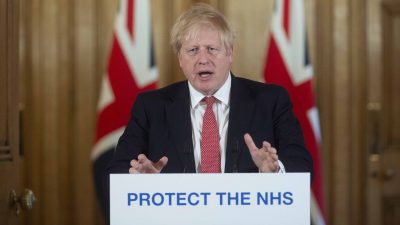Boris Johnson Returns to a Barrage of Criticism over Covid-19

3 weeks is a long time in politics these days, and a particularly long time in this coronavirus pandemic. As UK Prime Minister Boris Johnson returned to 10 Downing Street on Monday, it was to a different Britain from the one he had left when admitted to hospital at the beginning of April. Gone was the #PrayForBoris hashtag on Twitter, it had been replaced with #Panorama after the BBC programme which aired on Monday night, exposing gaping holes in the government’s handling of the Covid-19 crisis.
The surge of patriotic enthusiasm that was reflected by the ‘clapping for carers’ trend has gradually waned. People are now beginning to question why the nation wasn’t more prepared. The dire lack of Personal Protective Equipment (PPE) for healthcare workers has in part led to the deaths so far of over 100 NHS staff. The Panorama programme detailed that not only had the government stockpiled inadequate levels of PPE, but their lists included things like bin liners which would not normally be considered as PPE. The plastic aprons and surgical masks also being counted as PPE are a far cry from what we see medical staff wearing in other countries – they are fully clothed in hazmat suits and goggles. The BBC programme contains interviews from medical personnel who feel let down by the system, who compare it to going into battle without armour. These doctors and nurses know that they may die at work. There are clearly problems with a mismanaged NHS and a malfunctioning supply chain which results in companies which manufacture PPE in the UK, right now, sitting without any orders from the British government. Obviously, someone hasn’t read an email; someone, somewhere isn’t doing their job.
But aside from incompetence, which is a natural human trait, and can be found everywhere, there appears a lack of understanding of the importance of PPE on a national level in Britain. I compare my experience of Russian hospitals, and in particular infection wards, with hospitals in Britain. The first thing I am obliged to do when visiting any hospital or clinic in Russia is hand over my coat to the cloakroom assistant and put on a pair of ‘bakhili’ or blue plastic shoe coverings. And this is nothing new – it dates back to Soviet times – has always long been the case, long before the days of Covid-19. Doctors and nurses are immaculate, women wear hair tied back and often covered. Infections wards are completely out of bounds for visitors and even the fathers of newborn babies are not allowed into the neonatal wards – in many a Russian TV series or film you will see the father shouting through the window to his wife. Now efforts have been stepped up. As one nursing relative told me: ‘Masks are obligatory for everyone in hospital, as are shoe coverings. For medical staff they must wear head coverings and two layers of overalls. It is forbidden now to visit hospitals and if something needs to be passed on to a patient, it is cleaned with antiseptic.’
In Britain, once upon a time, it was also the case. When my mother was a nurse in the 1960s she spoke of the high hygiene standards, maintained by ‘matron’ on each ward, and compared the way doctors and nurses dressed in the past to nowadays. Hair had to be short or covered up and male doctors had to be clean shaven. Nursing uniforms were taken off before leaving the hospital. Visitor numbers were strictly limited as were visiting hours. All this has changed in recent decades. Take for example the video uploaded to social media of 94 year old coronavirus patient Dennis Palmer being wheeled on a trolley out of the Barnet hospital in North London just the other week. All the medical staff lining the corridors, and onlookers, were completely bereft of PPE. One would assume that all hospital staff, particularly in areas of a hospital treating Covid-19 patients, would have a basic level of PPE such as an overall and a mask. But this is clearly not the case, and it was not even obtained for a PR moment such as this.
Only the strictest of measures will beat this pandemic. Take even the decision by Russia to close its borders. Why has Britain not done the same? Not only has it not shut its borders, but it is not testing any incomers to the country, nor are any travellers obliged to sit in quarantine. As the FT puts it, Britain is ‘setting itself apart’ by not imposing stricter measures. It quotes Professor Gabrielle Scally, president of epidemiology and public health at the Royal Society of Medicine, who refers to the UK as an ‘outlier’ and that “It is very hard to understand why it persists in having this open borders policy. It is most peculiar.” In a world where 90% of people live in countries where restrictions are placed on incomers, Britain still is not testing the 15,000 daily arrivals to its border. And the experts don’t understand why Britain is not following the example of other countries such as Japan, China and Germany, that have all tightened their travel restrictions since the outbreak began. It’s a strange, ironic twist from a party of Brexiteers that has spent the last several years explaining why Britain needed tighter border controls and immigration control.
In politics, stupidity is not a handicap, Napoleon Bonaparte is supposed to have said. Some things never change.
*
Note to readers: please click the share buttons above or below. Forward this article to your email lists. Crosspost on your blog site, internet forums. etc.
This article was originally published on InfoBrics.
Johanna Ross is a journalist based in Edinburgh, Scotland.
Featured image is from InfoBrics

